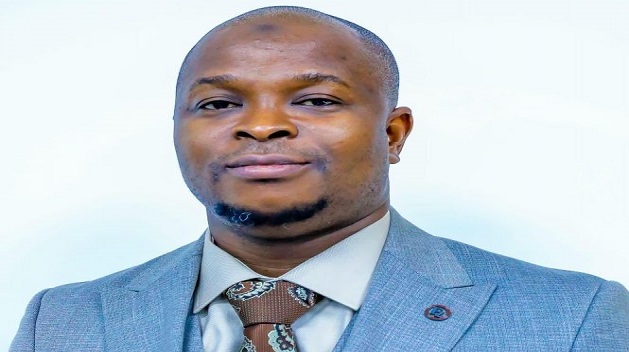Telecom
World Consumer Rights Day: QNET Reiterates Commitment to Consumer Rights Protection & Advocacy

QNET, a renowned global entity in the lifestyle and wellness direct-selling sector, has reaffirmed its commitment to protection of consumer rights.

Mr. Biram Fall, QNET’s Regional General Manager (RGM)
Biram Fall, QNET’s Regional Manager for Sub-Saharan Africa, who was represented by Nana Quartey, QNET’s Senior Regional Legal Counsel for Sub Sahara Africa, reiterated this commitment while speaking at a consumer rights conference and exhibition held on Friday, at Eko Hotels and Suites, Victoria Island, Lagos.
The Conference organised by Lagos State Consumer Protection Agency (LASCOPA) in collaboration with QNET was in commemoration of this year’s world Consumer Rights Day and was Themed: “Fair And Responsible AI for Consumers.”
Speaking at the event, Mr.Fall reassured its customers of the company’s commitment in ensuring that their rights are protected as well as building and promoting culture of transparency.
According to him, “At QNET, we are deeply committed to protecting the rights of our customers and promoting a culture of transparency, integrity, and trust.
“Through initiatives such as educational campaigns and awareness programs, we strive to empower consumers with the information they need to navigate the marketplace confidently.
“We also recently launched two campaigns, the social awareness campaign and the Say No Campaign. These campaigns perfectly reflect QNET’s commitment to transparency, integrity, and consumer empowerment.
In order to ensure that their consumers rights are protected, Mr. Fall stated that they recently introduced and implemented a robust grievance redressal mechanism to help address customer concerns promptly and effectively.
“In response to the prevalence of fraud cases misusing our brand name, a comprehensive fraud-proofing strategy has been implemented to ensure our integrity.
“These include proactive steps, such as the Electronic Know Your Customer (eKYC) initiative wherein every promoter of our products must verify their identity in our system with a government issued ID.
“We also publish warnings and notices on our corporate website and blog to enhance security and disseminate crucial information.
“In addition to these, we have launched a dedicated Complaint Mechanism (via email and WhatsApp) that provides avenues for our customers and promoters to engage with us on matters that affect their rights.
“These collective efforts underscore our dedication to creating a secure business environment for our customers and at the same time, collaborate with the authorities in holding fraudsters accountable,” he added.
Speaking earlier, Gov. Babajide Sanwo-Olu, of Lagos State assured stakeholders that his administration would continue to create an enabling environment that promotes fair competition, protects consumer rights, and supports the development of small and medium-sized enterprises.
The governor said mutual understanding between consumers and producers underscored the symbiotic and interdependent relationship that existed between the two entities within any economy.
He, therefore, urged consumers and producers to foster an enduring partnership, rather than relationships that could impede sustainable growth and development in the economic value chain.
According to him, the call is necessary because it reflects a broader acknowledgment of the interconnectedness of economic actors and the need for harmonious interactions to address challenges, innovate, and adapt to changing market dynamics.
“Consumers and producers are not adversaries but rather partners in a complex economic ecosystem.
“While consumers rely on producers to supply goods and services, producers, in turn, depend on consumer demand to drive their businesses forward,” he said.
Mr Afolabi Solebo, General Manager LASCOPA, in his welcome address, said that developers and companies must prioritize ethical considerations in ensuring that AI benefits the society as a whole.
Solebo noted that responsible AI involved transparency and accountability,
According to him, consumers deserve to know how their data is being used and have the right to understand the decisions made by AI systems.
Telecom
Study Shows Blocks in Telegram are Pushing the Underground Out

Modern messengers, such as WhatsApp, Telegram, Signal and others, are often used for illicit purposes. Kaspersky Digital Footprint Intelligence has conducted an in-depth monitoring of over 800 blocked cybercriminal Telegram channels between 2021 and 2024.

While a range of illegal activities continues to be hosted on the platform, its environment has become noticeably more challenging for sustained underground operations.
Telegram’s bot framework and other built-in features make for a low-effort ecosystem for the underworld.
A single bot can simultaneously manage queries, process cryptocurrency payments, and instantly deliver stolen bank cards, info-stealer logs, phishing kits, or DDoS attacks to hundreds of buyers per day, often without operator involvement.
Unlimited, non-expiring file storage eliminates the need for external hosting when distributing multi-gigabyte database dumps or stolen corporate documents. This frictionless automation naturally favours high-volume, low-price, low-skill offerings, such as leaked bank cards or other data, hosting malware, etc.
High-value, trust-dependent deals (for instance, zero-day vulnerability information) still remain on reputation-gated dark-web forums.
Kaspersky researchers found two clear trends related to illegal activities on Telegram. The average lifespan of shadow channels has increased, with the proportion of channels surviving over nine months more than tripling in 2023-2024 compared to 2021–2022. At the same time, Telegram’s blocking activity has risen significantly.
Monthly takedown figures recorded since October 2024 – even at their lowest – are comparable to the peak levels seen throughout 2023, and the overall pace continued to accelerate in 2025. This impedes malicious activities.
Other disadvantages of Telegram for cybercriminals include the lack of default end-to-end (E2E) encryption for chats, the inability to use their own servers for communication (due to the messenger’s centralised infrastructure), and closed server-side code, which makes it impossible to verify its functionality.
As a result, several established underground communities, including the nearly 9,000-member BFRepo group and the Angel Drainer malware-as-a-service operation, have already begun shifting primary activity to other platforms or proprietary messengers, citing repeated disruptions of their activities on Telegram.
“Fraudsters find Telegram a convenient tool for many malicious activities, but the risk-reward balance is clearly shifting. Channels are managing to stay online longer than a couple of years ago, yet the dramatically higher volume of blocks means operators can no longer count on long-term stability.
“When a storefront or service disappears overnight – and sometimes reappears only to be removed again weeks later – building a reliable business becomes much harder. We’re starting to see the early stages of migration as a direct consequence,” comments Vladislav Belousov, Digital Footprint Analyst at Kaspersky.
Telecom
Galaxy Backbone Marks Two Decades of Powering Nigeria’s Digital Evolution

Galaxy Backbone Limited (GBB), the Federal Government’s leading ICT infrastructure and shared services provider, will mark its 20th anniversary in June 2026 with a grand celebration that reflects two decades of innovation, resilience, and national impact.

Since its inception in 2006, Galaxy Backbone has been at the heart of Nigeria’s digital transformation journey; building the technological foundation that supports modern government operations and public service delivery. What began as a bold vision to connect government has grown into a critical national platform that drives efficiency, transparency, collaboration and innovation across the public sector.
Over the last 20 years, GBB has helped redefine how government works. By providing secure connectivity, enterprise-grade data centre services, cloud platforms, and digital collaboration tools, Galaxy Backbone has enabled Ministries, Departments and Agencies (MDAs) to move from fragmented, paper-based processes to more integrated, technology-driven systems.
This transformation has improved government-to-government coordination, strengthened engagement with businesses, and enhanced the delivery of services to citizens. Today, the digital infrastructure powered by Galaxy Backbone supports thousands of government users, hundreds of institutions, and critical national platforms that Nigerians rely on daily.
A key part of this journey has been the Federal Government of Nigeria’s investment, managed by GBB in robust national infrastructure, high-capacity and world class data centres, fibre-optic connectivity across multiple states, secure hosting services, and shared platforms that have helped government operate more efficiently and responsively. These contributions have played a pivotal role in Nigeria’s progress toward a more digital, agile and citizen-centered public service.
Galaxy Backbone’s impact has earned both national and global recognition. In 2025, the organisation was ranked first overall in the Federal Government Website Performance Scorecard, reflecting its commitment to excellence in digital service delivery. Internationally, GBB, a couple of years ago, received the prestigious United Nations Public Service Award, a testament to its leadership in promoting a whole-of-government approach to digital transformation.
As GBB celebrates two decades of service, this milestone is more than an organisational anniversary; it is a celebration of Nigeria’s digital evolution. It is an opportunity to appreciate how collaboration between government, industry partners, technology providers, and dedicated public servants has helped build a stronger, more connected nation.
The June 2026 anniversary celebration will bring together stakeholders from across the public and private sectors to reflect on the journey so far, acknowledge the partnerships that have shaped this success, and chart an ambitious course for the future. It will highlight how collective effort, shared vision, and innovation have positioned Galaxy Backbone as a strategic national asset.
Looking ahead, Galaxy Backbone remains committed to deepening digital transformation across the country; expanding infrastructure, strengthening cybersecurity, enhancing service delivery, and supporting the Federal Government’s drive for a smarter, more efficient and digitally empowered Nigeria.
At 20 years, Galaxy Backbone stands proud of its past, confident in its present, and inspired by the limitless possibilities ahead.
Telecom
Galaxy Backbone Marks 20 Years, Tops FG Website Scorecard

Galaxy Backbone Limited (GBB), Nigeria’s leading federal ICT infrastructure provider, has announced its 20th-anniversary celebration for June 2026, marking two decades since unifying government’s fragmented digital landscape into a secure national platform.

Galaxy Backbone
The announcement by Head of Media and Corporate Communications Chidi Okpala follows GBB’s top ranking in the 2025 Federal Government Website Performance Scorecard by the Bureau of Public Service Reforms, cementing its leadership in digital service delivery and transparency.
Managing Director Professor Ibrahim Adepoju Adeyanju described the milestone as celebrating Nigeria’s shift from paper-based silos to a cloud-first, integrated government. Achievements include the UN Public Service Award for 1-GOV.net, high-speed fiber deployment for G2G and G2B interactions, IPPIS payroll rollout, and pandemic-era digital support.
The June event will gather public-private stakeholders, global tech partners, and policymakers to unveil GBB’s next-decade roadmap emphasising cybersecurity, AI in public service, and rural connectivity.
GBB positions itself at the forefront of Nigeria’s 2030 digital nation drive, with 20 years of innovation signaling a smarter, connected future.

 E-Financial2 days ago
E-Financial2 days agoAngst as FG Demands 7.5 Percent VAT on Mobile Bank Transfers, USSD

 News2 days ago
News2 days agoMoniepoint Launches Second Cohort of DreamDevs Initiative to Double Down on Africa’s Tech Talent Pipeline

 E-Financial2 days ago
E-Financial2 days agoNGX lists 3.156bn UBA shares, boosting capital to N513Bn

 E-Financial2 days ago
E-Financial2 days agoThe Missing Pieces in Nigeria’s Banking Recapitalisation

 Telecom2 days ago
Telecom2 days agoGlo Unveils Immersive Gaming Experience, Travel Saga

 E-Business2 days ago
E-Business2 days agoHalf of Global Companies Build SOCs to Enhance Cybersecurity, with a Focus on Human Expertise

 General News2 days ago
General News2 days agoNITDA DG Reaffirms Nigeria–U.S. Partnership on Data Privacy, AI and Cybersecurity

 General News2 days ago
General News2 days agoParadigm Initiative Condemns the Internet Shutdown and Media Restrictions in Uganda Ahead of the 2026 General Election

























